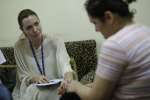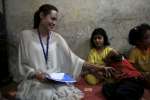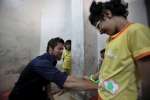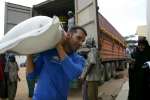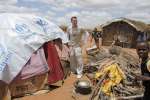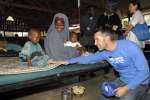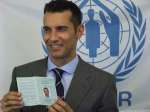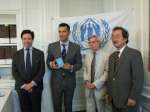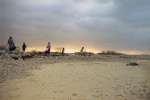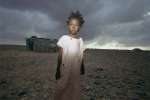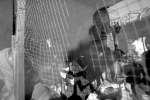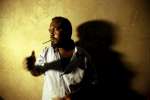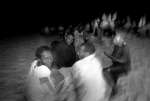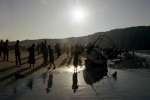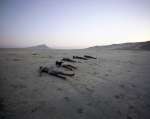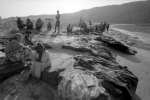- Text size
 |
|  |
|  |
| 
- Français
Somali refugees win the heart of Spanish Goodwill Ambassador
News Stories, 6 August 2008
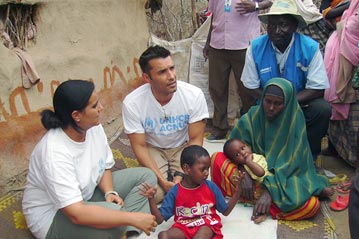
DADAAB REFUGEE CAMP, KENYA, Aug. 6 (UNHCR) – Jesús Vázquez could not wait to return to Dadaab. The well-known Spanish television presenter had promised refugees and humanitarian workers he'd be back after his first visit in March 2007 – and last week he was there for his first field mission after being named UNHCR Goodwill Ambassador in mid-July.
Leaders and youngsters of Ifo camp, one of the three in the Dadaab complex, greeted Jesús Vázquez with songs and dances when the Spanish celebrity landed in the semi-desert area near the Kenyan-Somali border in north-eastern Kenya. There UNHCR and its partners assist more than 200,000 refugees who have been arriving since 1991, mainly fleeing Somalia's devastating a civil war.
"When we learned about your TV campaigns and your support from Europe, we knew you were not (just) one of the many whites that come to visit us with their cameras," said Bashir, one of the camp elders welcoming Vázquez..
But he did have cameras in tow. Accompanied by a TV crew from Tele5 channel, Vázquez visited UNHCR-funded projects in Nairobi, a settlement for internally displaced Kenyans in Naivasha in the Rift Valley before arriving at the three Dadaab camps some 500 kilometres north-east of Nairobi.
The Goodwill Ambassador was keen to gather first hand information and images of educational activities to be used for awareness and fundraising activities, as well as to monitor the progress on a project to set up a camp radio station, for which he raised nearly half a million dollars last year.
Solar radios have already been distributed, refugees have been trained and a place for installation of the radio station has been identified in the camps, but complex procedures involving a number of government bodies meant the project has not become operational as quickly as UNHCR would have liked.
To try to speed up the process, during his stay in the capital Vázquez met with high ranking officials from the Presidency and the Ministry of Information and Communication, who expressed their willingness to support the implementation of the radio project in Dadaab.
"The radio station will allow us to get directly into the homes of thousands of refugees at once and to convey important messages on health, logistics and education that are traditionally transmitted through the camp leaders equipped with loudspeakers block by block around the camps," said Liz Ahua, UNHCR's Representative in Kenya.
During his talks with refugees in Dadaab, Vázquez was clearly deeply moved by their passion for education. "I believe that education is the most precious gift that we can offer to the youth," he told the refugees. "I know many of you walk eight kilometres a day to go to and from school and that you share one book among four or six pupils. I'm committed to support UNHCR with funds for education as a window for hope, something you can take with you wherever you go."
Particularly concerned about gender issues, Vázquez asked leaders, teachers and students for a stronger commitment to increase the number of girls attending school. In the Somali culture, many girl students drop out of school at the age of 13 in order to get married, to assist in the household tasks or simply because they do not feel safe by leaving their homes if they have not been circumcised. Mothers or families who have decided not to proceed with the genital mutilation of their daughters, are often victims of threats and are marginalized by the community.
Not only were Vázquez and his crew able to send back reports for Spanish television from Kenya, but the Spanish Goodwill Ambassador also found the mission personally rewarding.
"A piece of my heart stays with you," he told the refugees, "but I return with my batteries recharged, and with the conviction that investing in education is preparing the next generation to contribute to peace building."
By María Jesús Vega in Nairobi and Dadaab, Kenya

